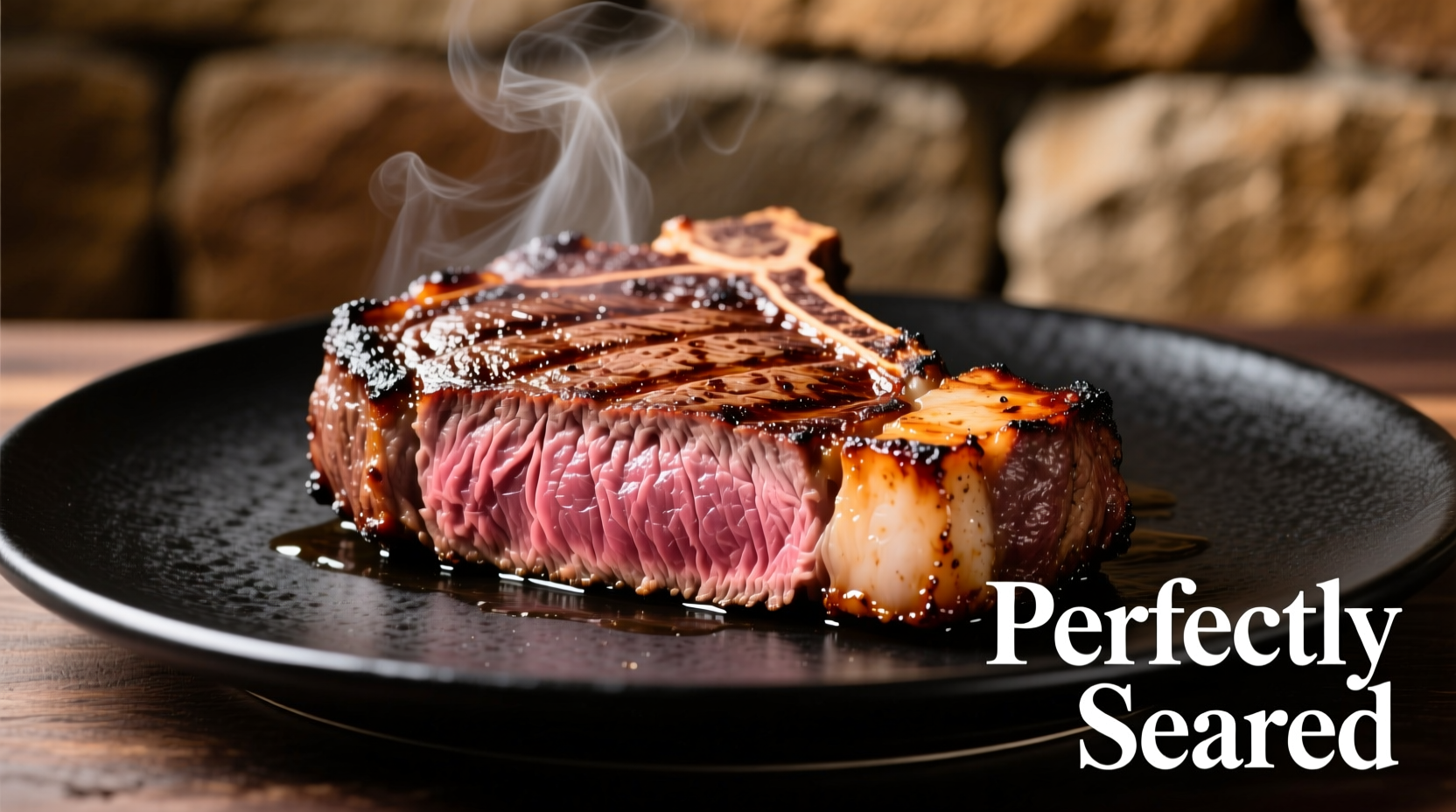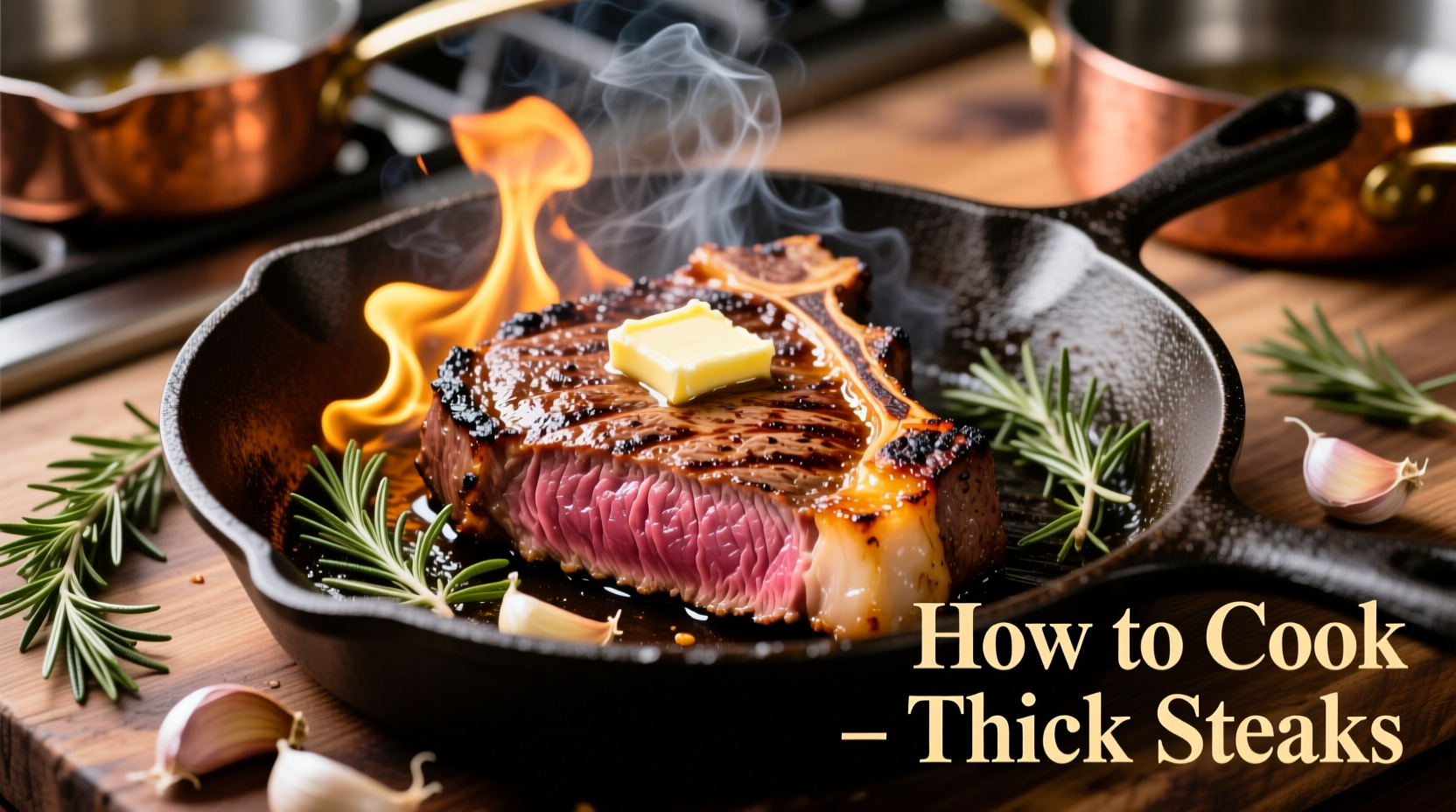For perfect thick steaks (1.5+ inches), use a two-stage cooking method: sear at high heat to create a crust, then finish at lower temperature to reach desired doneness without overcooking the exterior. Use a meat thermometer to verify internal temperature reaches 130-135°F (54-57°C) for medium-rare. Rest for 8-10 minutes before slicing.
Master Thick Steak Cooking Like a Professional Chef
Thick-cut steaks demand specialized techniques that differ significantly from standard cuts. When you're working with 1.5-inch or thicker steaks, conventional cooking methods often result in either a burnt exterior with raw center or an overcooked piece of meat. The solution lies in understanding heat transfer physics and implementing professional kitchen strategies that home cooks can easily master.
Why Thick Steaks Require Special Treatment
Steaks thicker than 1.5 inches present unique challenges because heat penetrates meat at approximately 1/4 inch per minute. Attempting to cook a 2-inch steak entirely over high heat creates a massive temperature gradient - you'll develop an unpleasantly charred crust long before the center reaches proper temperature. This is why professional kitchens universally employ multi-stage cooking for thick cuts.
Essential Preparation Steps for Thick Steaks
Proper preparation makes the difference between good and exceptional results:
- Temperature equalization: Remove steaks from refrigerator 45-60 minutes before cooking to reduce the thermal shock during cooking
- Dry surface: Pat thoroughly with paper towels - moisture is the enemy of proper searing
- Salt timing: Apply kosher salt at least 40 minutes before cooking to enhance flavor penetration without drawing out excessive moisture
- Oil selection: Use high-smoke point oils like avocado or grapeseed oil (smoke point > 400°F/204°C) for optimal searing
Three Proven Methods for Perfect Thick Steaks
Reverse Sear Technique (Most Reliable)
This method delivers the most consistent results for thick steaks. Start by cooking low and slow, then finish with a high-heat sear:
- Preheat oven to 275°F (135°C)
- Place steak on wire rack over baking sheet
- Cook until internal temperature reaches 115°F (46°C) for medium-rare (approximately 45-60 minutes for 2-inch steak)
- Heat cast iron skillet until smoking
- Sear steak 60-90 seconds per side until deep brown crust forms
Oven-to-Stovetop Method
Ideal when you need faster cooking time:
- Preheat oven to 400°F (204°C)
- Sear steak 2 minutes per side in smoking hot skillet
- Transfer skillet to oven
- Cook until desired internal temperature is reached (15-25 minutes depending on thickness)
- Finish with additional 30-second sear if needed
Grill Method for Thick Steaks
When outdoor cooking is preferred:
- Create two-zone fire (hot side for searing, cooler side for finishing)
- Sear steak 2-3 minutes per side over direct heat
- Move to indirect heat side, cover grill
- Cook until internal temperature reaches target (15-25 minutes)
- Optional: Finish with 60-second sear over hottest part of grill
Authoritative Temperature Guide for Thick Steaks
Following scientifically validated temperature guidelines ensures food safety while achieving perfect doneness. The USDA Food Safety and Inspection Service provides these official recommendations for beef steaks:
| Doneness Level | Internal Temperature | Visual Characteristics |
|---|---|---|
| Rare | 120-125°F (49-52°C) | Very red center, soft texture |
| Medium Rare | 130-135°F (54-57°C) | Warm red center, slightly firm |
| Medium | 140-145°F (60-63°C) | Pink center, firm texture |
| Medium Well | 150-155°F (66-68°C) | Slightly pink center, very firm |
| Well Done | 160°F+ (71°C+) | No pink, very firm, minimal juices |
Always use an instant-read thermometer for accuracy - thick steaks require precise temperature monitoring as visual cues alone are unreliable. The American Meat Science Association confirms that temperature measurement is the only reliable method for determining steak doneness.
Resting: The Critical Final Step
Resting thick steaks properly allows juices to redistribute throughout the meat. For steaks 1.5 inches or thicker, follow these guidelines:
- Rest for 8-10 minutes (1 minute per 1/4 inch of thickness)
- Cover loosely with foil to retain heat without trapping steam
- Place on cutting board with slight incline to collect juices
- During resting, internal temperature will rise 5-10°F (carryover cooking)
Skipping this step causes up to 40% more juice loss when slicing, according to research published in the Journal of Food Science. This is especially critical for thick steaks which have more internal moisture to redistribute.

Avoid These Common Thick Steak Mistakes
Even experienced cooks make these errors when preparing thick steaks:
- Peeking too often: Each time you lift the steak, you lose heat buildup essential for proper crust formation
- Overcrowding the pan: Causes steaming instead of searing - cook one steak at a time if necessary
- Moving too soon: Wait until steak releases naturally from the cooking surface before attempting to flip
- Skipping the thermometer: Thick steaks require precise temperature monitoring - visual cues alone are unreliable
- Cutting too soon: Slicing before proper resting releases precious juices onto the cutting board
Pro Tips for Restaurant-Quality Results
Professional chefs employ these advanced techniques for perfect thick steaks:
- Butter basting: During final searing, add cold butter, garlic, and herbs to the pan and continuously spoon over the steak
- Edge searing: For extremely thick cuts, briefly sear the fatty edge to render excess fat
- Temperature monitoring: Insert thermometer horizontally through the side to get an accurate center reading
- Post-rest temperature check: Verify final temperature after resting to ensure perfect doneness
Thick Steak Thickness vs. Cooking Time Reference
Use this professional kitchen reference chart as a starting point (adjust based on your specific equipment and desired doneness):
| Thickness | Reverse Sear Oven Time | Final Sear Time | Total Cooking Time |
|---|---|---|---|
| 1.5 inches | 35-45 minutes | 60-75 seconds/side | 50-65 minutes |
| 1.75 inches | 40-50 minutes | 75-90 seconds/side | 55-70 minutes |
| 2 inches | 45-60 minutes | 90-120 seconds/side | 60-80 minutes |
| 2.5 inches | 55-75 minutes | 120-150 seconds/side | 75-100 minutes |
Remember that these times are estimates - always verify with a thermometer. The Culinary Institute of America's research shows that variables like starting temperature, exact oven temperature, and steak composition significantly affect cooking times.
Final Thoughts on Thick Steak Mastery
Cooking thick steaks perfectly requires understanding the science behind heat transfer and protein behavior. By implementing the reverse sear method with precise temperature monitoring, you'll consistently achieve restaurant-quality results at home. Remember that patience is essential - rushing any stage of the process compromises the final result. With practice, you'll develop the intuition to recognize visual and textural cues that complement your thermometer readings.











 浙公网安备
33010002000092号
浙公网安备
33010002000092号 浙B2-20120091-4
浙B2-20120091-4